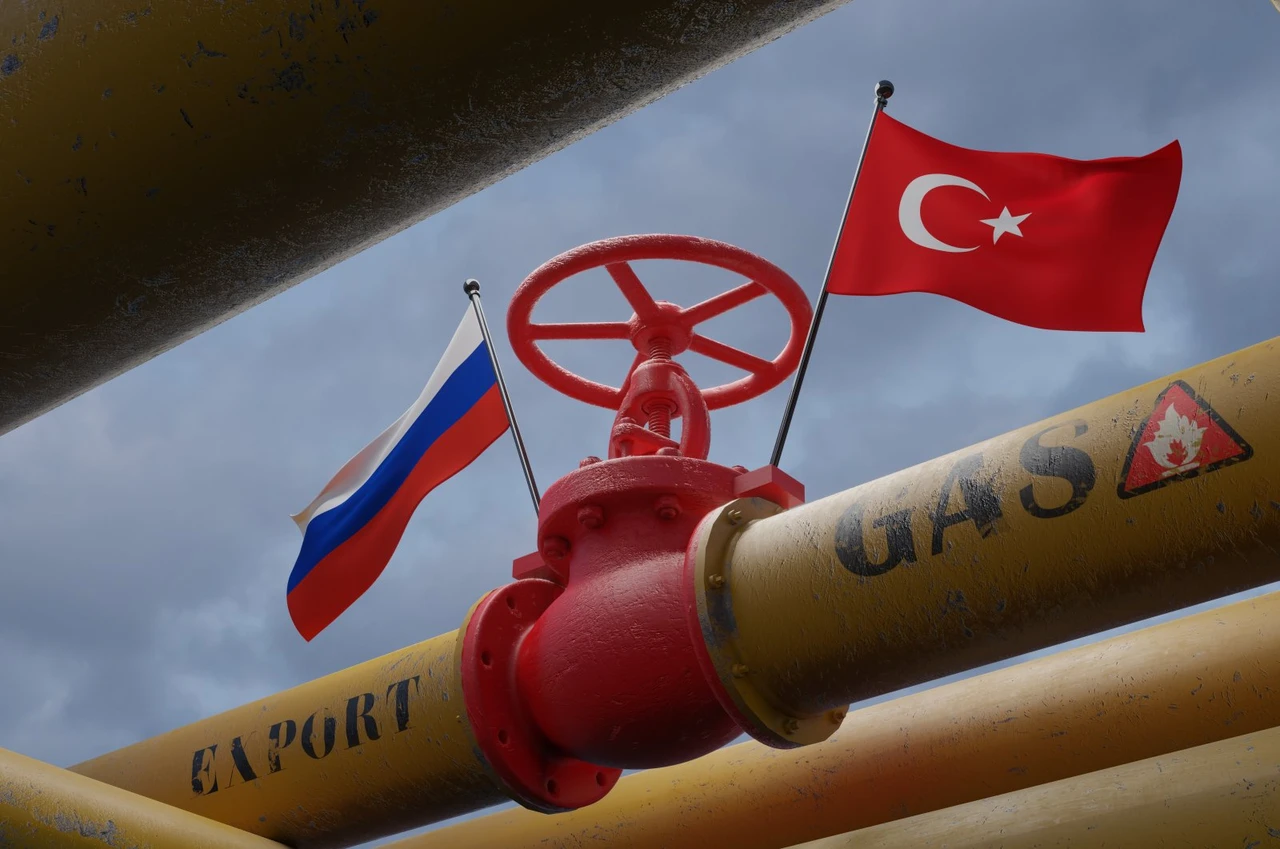Russia remains key player in Türkiye’s oil, gas sectors despite efforts to diversify
 Illustration shows the gas pipeline with the flags of Türkiye and Russia. (Photo by Getty Images)
Illustration shows the gas pipeline with the flags of Türkiye and Russia. (Photo by Getty Images)
Despite Türkiye’s vigorous efforts to diversify its energy sources, Russia maintains a pivotal role as a leading partner in Türkiye’s oil and gas sectors. Türkiye has recently signed long-term contracts with multiple partners, yet Russia’s significance in Türkiye’s energy mix remains substantial.
In 2023, Türkiye’s energy landscape witnessed significant developments highlighted by the Energy Market Regulatory Authority (EPDK) and GAZBIR 2023 reports.
No change in the main natural gas suppliers
- Türkiye’s dependence on natural gas for heating, electricity generation and industry remains steadfast.
- Actual natural gas imports in 2023 totaled 50 bcm, slightly below the anticipated 56 bcm.
- Azerbaijan 10.2 bcm (21%), Algeria 6 bcm (12%) and Iran 5.4 bcm (11%) continue as primary suppliers, with Russia leading at 21 bcm (42.2%).
Türkiye’s strong commitment to energy strategy with Russia
Türkiye’s consistent reliance on Russian gas, holding above 40% for almost 3 years despite minor fluctuations, underscores its divergence from Europe. Following the start of the Ukraine War, EU countries rapidly reduced their gas imports from Russia.
While the EU’s share of Russian gas (both pipeline and LNG) was close to 40% in 2021, it dropped to 15% in recent years. In contrast, Türkiye’s stable stance suggests a strong commitment to Russian gas in the near term.
Türkiye’s recent agreement with ExxonMobil in May to import 3.1 bcm annually could alter rankings, potentially increasing the U.S.’s market share beyond the current 8%, provided other suppliers continue deliveries.
Increase in natural gas production, exports
- Türkiye’s natural gas production increased by 113% in 2023, reaching 807.3 million cubic meters.
- Zonguldak led production with 337.8 million cubic meters, primarily from Black Sea gas fields. Tekirdag (243.3 million cubic meters), Kirklareli (108.7 million cubic meters), Düzce (55.9 million cubic meters), and Istanbul (55.9 million cubic meters).
- Exports rose by 54% to nearly 900 million cubic meters, with LNG exports showing notable growth.
- Considering consumption and production data, Türkiye ranks as Europe’s 5th-largest natural gas market, consuming 50 bcm annually.
Natural gas consumption trends
According to GAZBIR’s 2023 Natural Gas Report, natural gas is utilized across five main sectors: residential (35%), power plants (28%), industrial (24%), services (11%) and energy (2%). Despite economic challenges affecting the industrial sector, gas usage remains resilient.
Petroleum sector insights
Türkiye’s petroleum imports increased by 3.34% in 2023, totaling 49 million tons.
Russia emerged as a major supplier, exporting 10.7 million tons of crude oil and significant diesel volumes. This brought Russia’s total petroleum exports to Türkiye to 25 million tons, or 51%.
Following the Ural crude oil price cap imposed by the EU and G7 countries at $60, Russia sought alternative markets, offering discounts as high as $20 to countries like China, India, and Türkiye. This strategy also extended to processed petroleum products, evidenced by increased diesel imports.
Consequently, domestic production of diesel decreased by 5.4% to 16.4 million tons, with a similar decline in gasoline production to 4.9 million tons, down 4.4%.
Pipeline issues, supplier shifts
Iraq, previously a top supplier, now ranks second after Russia, contributing 9.8 million tons or 20% of Türkiye’s petroleum market share. The decline is partly attributed to the cessation of oil flow through the Kerkük-Yumurtalık Pipeline since March 2023, following an arbitration ruling unfavorable to Türkiye during President Erdogan’s April visit to Iraq.
Kazakhstan emerged as another significant supplier, exporting nearly 1.4 million tons via the Baku-Tbilisi-Ceyhan pipeline and other routes. Astana-Nur Sultan contributed 5.7 million tons to Türkiye’s market share, totaling 11%.
Domestic production and export
- Türkiye’s petroleum exports increased by 5.2% to 13.35 million tons, with the U.S. leading at 17.73%, followed by varying shares from EU countries.
- Domestic production of diesel and gasoline saw declines, influenced by increased imports and global pricing strategies.
Conclusion
- Despite increasing focus on renewable energy, natural gas and petroleum remain pivotal in Türkiye’s energy landscape.
- Established suppliers like Russia maintain dominance, while Türkiye explores new market dynamics and energy security strategies for the future.



